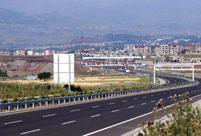BEIJING, May 8 (Xinhua) -- With trade and economic ties more intertwined than ever, China and Africa are seeking ways to upgrade their cooperation as it rapidly expands from traditional areas to emerging industries, to benefit the people of both sides.
Observers say China-Africa trade and economic cooperation has broad prospects and the two sides need to work together to continuously tap their cooperation potential to overcome the "growing pains" in their relations and withstand various tests in the complicated global economic climate.
"The good thing about this partnership is that it's a give-and-take," said Faida Mitifu, the Democratic Republic of Congo's ambassador to Washington.
High economic complementarity and different levels of economic development have prompted the cooperation between China and Africa to upgrade gradually and become more quality-oriented.
Over the past half century, bilateral trade between China and Africa has been growing exponentially.
In 2013, it reached 210.2 billion U.S. dollars, 2,000 times that of 1960. China has been Africa's biggest trading partner for five years running.
Africa is now China's major source of imports, second largest overseas construction project contract market and fourth largest investment destination.
While trade ties between the two sides have been strengthening, their trade structure is also becoming increasingly optimized. Chinese investment has not only offered opportunities to China's industrial upgrading and economic structural adjustment but also promoted the strength of Africa's manufacturing industry and export capability.
In recent years, Africa's manufactured goods, including steel, copper, fertilizer and electronic products, have entered the Chinese market. Africa's exports to China have grown rapidly, running a trade surplus of 20.1 billion U.S. dollars in 2011.
The two economies were highly complementary, said Li Jinzao, China's Vice Minister of Commerce, adding the different levels of economic development between China and Africa provided a driving force for the booming trade and investment between them.
Inadequate infrastructure remained a major obstacle to Africa's economic development. Research has shown it costs Africa an annual loss of about 2 percent of its annual GDP.
From the Kariba North Bank hydropower plant in Zambia to the Addis-Adama Expressway in Ethiopia, China's infrastructure build-out has delivered the full complement of roads, ports, railways, airports and power stations in Africa, helping the continent break the bottleneck restricting its development by boosting trade and promoting human resources flow.
With bilateral trade and economic ties becoming increasingly diversified, cooperation between China and Africa has expanded to a wide range of areas, covering emerging industries such as finance, aviation, agriculture and tourism.
Chinese investment has created huge employment opportunities in Africa, playing a huge role in improving people's livelihood.
More than 2,500 Chinese companies are now making investment or doing business in 50 countries in Africa, creating more than 100,000 local jobs.
While visiting the Oriental Industrial Park in Ethiopia on Tuesday, Li said China was ready to transfer the industries best suitable for Africa, especially the labor-intensive ones, to create more jobs on the continent.
Zhou Yongsheng, professor at China Foreign Affairs University, said China-Africa cooperation had shown signs of upgrading, as the two sides were increasingly supplementary to each other.
"The upgrading of bilateral economic and trade cooperation between China and Africa has shown that China gets new opportunities from Africa's booming economy, while Africa gets new impetus from China's economic transition, and the China-Africa cooperation has a promising future ahead," Zhou said.
 When we are young...
When we are young... Solar halo occurs in Lhasa
Solar halo occurs in Lhasa Photos give cheongsam a new life
Photos give cheongsam a new life Graduates bid farewell to campus in clown costume
Graduates bid farewell to campus in clown costume Badain Jaran Desert: Amazing curves of nature
Badain Jaran Desert: Amazing curves of nature Beautiful Chinese-built roads in Africa
Beautiful Chinese-built roads in Africa High fashion trend welcomed by costumers in Changsha
High fashion trend welcomed by costumers in Changsha About 100 cubs expected to be born in NE China's Siberian Tiger Garden
About 100 cubs expected to be born in NE China's Siberian Tiger Garden China wins 19th women's team title at table tennis worlds
China wins 19th women's team title at table tennis worlds The 'Chinese Dad'
The 'Chinese Dad' Chinese mountaineer's gear list
Chinese mountaineer's gear list  Newly recruited police in Hetian hold drill
Newly recruited police in Hetian hold drill  China's most luminous celebrities
China's most luminous celebrities Top 10 most expensive cars in the world
Top 10 most expensive cars in the world 'African Street' in Guangzhou
'African Street' in GuangzhouDay|Week|Month